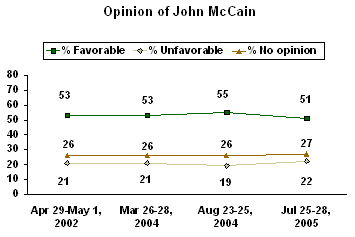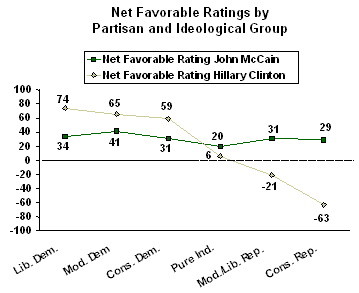GALLUP NEWS SERVICE
PRINCETON, NJ -- Arizona Senator John McCain is likely to be one of the major contenders for the 2008 Republican presidential nomination. McCain, a Vietnam War hero, has a generally conservative voting record in the United States Senate, but may be best known for some notable breaks from the Republican caucus on issues such as campaign finance reform and judicial nominations.
Gallup polling during the last several years shows McCain's favorable ratings running in the low 50s. While other politicians have similar favorable ratings, what sets McCain apart is that he is viewed similarly across party and ideological lines. A closer analysis of the data hints that McCain's support is not particularly strong among conservative Republicans, the constituency whose support will be key to winning the party's presidential nomination.
McCain's most recent favorable rating, from a July 25-28 Gallup Poll, is 51%. Twenty-two percent view him unfavorably, and 27% have no opinion. These figures are in line with what Gallup has found for McCain since 2002.

Combining the data from the four separate 2002-2005 surveys allows for a more detailed look at the public's opinions of McCain. Remarkably, the numbers show little variation due to political ideology -- 53% of self-identified conservatives, 53% of self-identified moderates, and 52% of self-identified liberals view McCain favorably. Conservatives (25%) and liberals (23%) are about equally likely to view him negatively.
The same pattern is evident by party affiliation -- 54% of Republicans, 51% of independents, and 53% of Democrats view him favorably. McCain's negatives are slightly higher among Republicans (25%) than independents and Democrats (19% each).
The aggregated data allow a detailed look at ideological groups within specific parties. Again, McCain's ratings are similar even across these more precisely defined groups. The notable exception are pure independents -- that is, those who do not identify with, nor "lean" to, either political party -- who have only 37% favorable ratings due to a high proportion of those without an opinion of McCain. But the ratio of positive-to-negative views among this group is still better than 2-to-1, as is the case with the other groups.
|
Views of John McCain, by Party and Ideology |
||||
|
Favorable |
Unfavorable |
No opinion |
Net favorable |
|
|
% |
% |
% |
|
|
|
Liberal Democrat |
57 |
23 |
19 |
+34 |
|
Moderate Democrat |
55 |
14 |
30 |
+41 |
|
Conservative Democrat |
51 |
20 |
30 |
+31 |
|
Pure independent |
37 |
17 |
46 |
+20 |
|
Moderate/Liberal Republican |
51 |
20 |
28 |
+31 |
|
Conservative Republican |
56 |
27 |
17 |
+29 |
Interestingly, moderate Democrats give McCain the highest net favorable rating at +41 (55% favorable minus 14% unfavorable). In fact, McCain's net ratings are no worse, and in some instances better, among the three Democratic groups than among the two Republican groups. McCain's net favorable rating among conservative Republicans is only +29, given this group's higher proportion of unfavorable views of McCain.
McCain in Context
On the surface, McCain's favorable ratings look similar to many other politicians. Take for example New York Senator Hillary Rodham Clinton, who could be McCain's rival in the 2008 presidential election. Clinton has a nearly identical 54% favorable rating average across the last four measurements (taken in 2004 and 2005) to McCain's 53%. However, Clinton's unfavorable ratings are much higher than McCain's, while substantially more Americans have no opinion of McCain.
Despite their similar favorable ratings, Clinton's and McCain's ratings look dramatically different beneath the surface. Views of Clinton are highly positive among those on the left of the American political spectrum, and highly negative among those on the right. Specifically, 80% of liberals have a favorable opinion of Clinton, compared with 59% of moderates and only 34% of conservatives. There is a similar divide by party, with 84% of Democrats, 53% of independents, and 24% of Republicans viewing the New York senator favorably.
The divergence of the public's views of Clinton are even greater when taking respondents' party affiliations and ideologies into account, showing a steep decline when moving from left to right on the political spectrum. For example, 85% of liberal Democrats have a favorable view of Clinton compared with just 17% of conservative Republicans. The net score for Clinton among liberal Democrats is +74, compared with -63 among conservative Republicans -- a gap of 137 points.
|
Views of Hillary Rodham Clinton, by Party and Ideology |
||||
|
Favorable |
Unfavorable |
No opinion |
Net favorable |
|
|
% |
% |
% |
|
|
|
Liberal Democrat |
85 |
11 |
4 |
+74 |
|
Moderate Democrat |
80 |
15 |
5 |
+65 |
|
Conservative Democrat |
76 |
17 |
6 |
+59 |
|
Pure independent |
46 |
40 |
14 |
+6 |
|
Moderate/Liberal Republican |
37 |
58 |
6 |
-21 |
|
Conservative Republican |
17 |
80 |
3 |
-63 |
A side-by-side graph of McCain's and Clinton's net ratings by partisan and ideological group underscore the differences. McCain's appeal is consistent across groups, but shallow in the sense that no group views him extremely positively. On the other hand, Clinton's appeal varies by group, but the three Democratic factions have overwhelmingly positive views of her.

Partisan and ideological divergence in public opinion of politicians is not confined to Clinton or even Democrats more generally. When Gallup last asked for overall opinions of President George W. Bush in a July 25-28 poll, 72% of conservatives, 42% of moderates, and 18% of liberals viewed him favorably. The results by party were even more polarized -- 89% of Republicans, 41% of independents, and 19% of Democrats viewed Bush favorably.
Even former New York City Mayor Rudy Giuliani, whose 64% favorable rating makes him one of the most popular Republican politicians, has much higher ratings among Republicans (80%) than independents (60%) or Democrats (56%).
McCain and the 2008 Nomination
Gallup has twice asked Republicans for their preference for their party's 2008 nominee from among a list of possible candidates. While McCain placed no worse than second in either poll, in both cases his support is lower among conservative Republicans than among moderate or liberal Republicans.
Last November, Gallup asked Republicans to choose their preferred 2008 nominee from among Giuliani, McCain, and Florida Governor Jeb Bush. McCain's support was 10 percentage points higher among liberal and moderate Republicans than among conservative Republicans. Jeb Bush appealed more to conservatives than liberals and moderates, while Giuliani's support was roughly equal between the two groups.
|
Preference for the Republican Nomination |
|||
|
All Republicans |
Liberal/Moderate Republicans |
Conservative Republicans |
|
|
% |
% |
% |
|
|
Rudy Giuliani |
47 |
49 |
47 |
|
John McCain |
26 |
33 |
23 |
|
Jeb Bush |
17 |
7 |
22 |
A CNN/USA Today/Gallup poll conducted earlier this month asked Republicans to choose from a longer list of contenders (which excluded Bush, who has indicated he does not plan to run for the 2008 nomination). While McCain and Giuliani are closely matched among all Republicans, the data suggest McCain's support is lower among conservative Republicans, though the difference is within the margin of error for this subgroup. Again, there is little difference in Giuliani's support by ideological affiliation.
|
Preference for the Republican Nomination |
|||
|
All Republicans |
Liberal/Moderate Republicans |
Conservative Republicans |
|
|
% |
% |
% |
|
|
Rudy Giuliani |
27 |
29 |
27 |
|
John McCain |
24 |
27 |
22 |
|
Condoleezza Rice |
18 |
19 |
16 |
|
Bill Frist |
8 |
4 |
11 |
|
Mitt Romney |
4 |
6 |
3 |
|
George Allen |
3 |
3 |
4 |
|
Sam Brownback |
2 |
3 |
1 |
|
George Pataki |
1 |
4 |
3 |
|
Chuck Hagel |
<1 |
1 |
<1 |
Implications
In a political environment characterized by widespread party polarization, it is hard to predict whether McCain's broad -- yet shallow -- appeal will be an asset or a weakness. It could be a weakness as most Republican presidential primaries are limited to registered members of that party, but it could be an asset in states with open primaries, those that allow independent (and in some cases Democratic) voters to participate in the Republican primary. Michigan and New Hampshire are two such states, and are two states in which McCain defeated George W. Bush in 2000. But McCain's victories in 2000 were limited and, aside from Michigan and his home state of Arizona, were confined to the more liberal and moderate Northeastern states. McCain's 2000 showing is consistent with his current appeal.
However, if McCain does well in the primaries and secures the Republican nomination, he could be a formidable candidate, especially against someone like Clinton who has more limited appeal outside her party. But McCain's fairly modest appeal to Republicans could also hurt his ability to mobilize supporters to work for and contribute to his campaign, as well as turn out to vote for him on Election Day.
Survey Methods
These results are based on telephone interviews with a randomly selected national sample of 3,538 adults, aged 18 and older, conducted April 29-May 1, 2002, March 26-28, 2004, Aug. 23-25, 2004, and July 25-28, 2005. For results based on this sample, one can say with 95% confidence that the maximum error attributable to sampling and other random effects is ±2 percentage points. In addition to sampling error, question wording and practical difficulties in conducting surveys can introduce error or bias into the findings of public opinion polls.